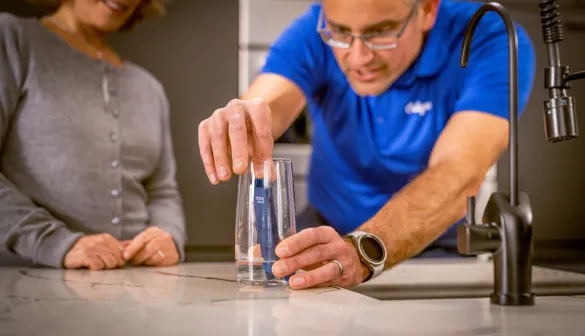What is in my water?

What is in My Water? Understanding Your Water Quality
Water is an essential part of our daily lives, from drinking and cooking to bathing and cleaning. But have you ever wondered what’s really in your water? While it may look clear, water can contain a variety of impurities, both natural and man-made. Knowing what’s in your water is the first step to ensuring the safety and health of your household.
Why the Water Source Matters
Where your water comes from has a lot to do with the impurities that may be in it. For instance, water that comes from an underground aquifer is more likely to be classified as “hard water” – meaning it contains high concentrations of dissolved minerals – than a surface water source, such as a lake. Hard water is safe to drink but can create a variety of problems in your home, including limescale buildup that can damage your plumbing.
A lake or reservoir, on the other hand, may be more likely to contain bacteria and sediment in comparison to groundwater.
No matter where your water comes from, it is bound to contain impurities. Even if your home receives water from a municipal source that has been treated to meet safe drinking water standards, your water likely contains contaminants that make it less than ideal for household use. Some of the impurities that homeowners frequently find troublesome include:

- Residual chlorine that lingers after disinfection
- Sulfur that causes an objectionable taste and odor
- Iron and manganese that can stain sinks and clothing
- Floating particles
Common Contaminants Found in Water
Minerals (Hard Water)
Hard water contains high levels of minerals like calcium and magnesium. While not harmful to health, it can cause buildup on appliances, reduce the effectiveness of soaps, and leave spots on dishes.
Chlorine
Commonly used to disinfect water, chlorine can leave an unpleasant taste or smell. Long-term exposure to high levels may have health implications.
Iron and Manganese
These metals can give your water a rusty color and metallic taste, staining sinks, clothing, and fixtures.
Bacteria and Viruses
Contaminants like E. coli and coliform bacteria can make water unsafe to drink, leading to serious health risks.
PFAS and Microplastics
Known as "forever chemicals," PFAS and microplastics are increasingly found in water supplies. These contaminants can pose long-term health risks and are difficult to remove without proper filtration.
Lead and Heavy Metals
Lead can leach into water from aging pipes, causing developmental issues in children and other health problems.
Why Test Your Water?
Testing your water helps uncover hidden impurities and provides the information needed to choose the right treatment solution. Whether you’re on city water or have a private well, regular water testing is essential to:
- Protect your family’s health.
- Maintain your home’s plumbing and appliances.
- Ensure clean, safe water for drinking, cooking, and bathing.

